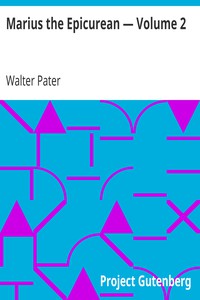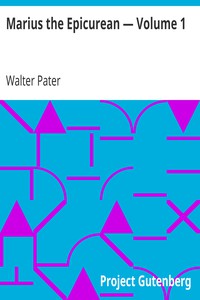Marius the Epicurean — Volume 2, Walter Pater [best romantic novels in english txt] 📗

- Author: Walter Pater
Book online «Marius the Epicurean — Volume 2, Walter Pater [best romantic novels in english txt] 📗». Author Walter Pater
TANTUM ERGO SACRAMENTUM VENEREMUR CERNUI:
ET ANTIQUUM DOCUMENTUM
NOVO CEDAT RITUI.
DIVINE SERVICE.
“Wisdom hath builded herself a house: she hath mingled her wine: she hath also prepared for herself a table.”
The more highly favoured ages of imaginative art present instances of the summing up of an entire world of complex associations under some single form, like the Zeus of Olympia, or the series of frescoes which commemorate The Acts of Saint Francis, at Assisi, or like the play of Hamlet or Faust. It was not in an image, or series of images, yet still in a sort of dramatic action, and with the unity of a single appeal to eye and ear, that Marius about this time found all his new impressions set forth, regarding what he had already recognised, intellectually, as for him at least the most beautiful thing in the world.
To understand the influence upon him of what follows the reader must remember that it was an experience which came amid a deep sense of vacuity in life. The fairest products of the earth seemed to be dropping to pieces, as if in men’s very hands, around him. How real was their sorrow, and his! “His observation of life” had come to be like the constant telling of a sorrowful rosary, day after day; till, as if taking infection from the cloudy sorrow of the mind, the eye also, the very senses, were grown faint and sick. And now it happened as with the actual morning on which he found himself a spectator of this new thing. The long winter had been a season of unvarying sullenness. At last, on this day he awoke with a sharp flash of lightning in the earliest twilight: in a little while the heavy rain had filtered the air: the clear light was abroad; and, as though the spring had set in with a sudden leap in the heart of things, the whole scene around him lay like some untarnished picture beneath a sky of delicate blue. Under the spell of his late depression, Marius had suddenly determined to leave Rome for a while. But desiring first to advertise Cornelius of his movements, and failing to find him in his lodgings, he had ventured, still early in the day, to seek him in the Cecilian villa. Passing through its silent and empty court-yard he loitered for a moment, to admire. Under the clear but immature light of winter morning after a storm, all the details of form and colour in the old marbles were distinctly visible, and with a kind of severity or sadness—so it struck him—amid their beauty: in them, and in all other details of the scene—the cypresses, the bunches of pale daffodils in the grass, the curves of the purple hills of Tusculum, with the drifts of virgin snow still lying in their hollows.
The little open door, through which he passed from the court-yard, admitted him into what was plainly the vast Lararium, or domestic sanctuary, of the Cecilian family, transformed in many particulars, but still richly decorated, and retaining much of its ancient furniture in metal-work and costly stone. The peculiar half-light of dawn seemed to be lingering beyond its hour upon the solemn marble walls; and here, though at that moment in absolute silence, a great company of people was assembled. In that brief period of peace, during which the church emerged for awhile from her jealously-guarded subterranean life, the rigour of an earlier rule of exclusion had been relaxed. And so it came to pass that, on this morning Marius saw for the first time the wonderful spectacle—wonderful, especially, in its evidential power over himself, over his own thoughts—of those who believe.
There were noticeable, among those present, great varieties of rank, of age, of personal type. The Roman ingenuus, with the white toga and gold ring, stood side by side with his slave; and the air of the whole company was, above all, a grave one, an air of recollection. Coming thus unexpectedly upon this large assembly, so entirely united, in a silence so profound, for purposes unknown to him, Marius felt for a moment as if he had stumbled by chance upon some great conspiracy. Yet that could scarcely be, for the people here collected might have figured as the earliest handsel, or pattern, of a new world, from the very face of which discontent had passed away. Corresponding to the variety of human type there present, was the various expression of every form of human sorrow assuaged. What desire, what fulfilment of desire, had wrought so pathetically on the features of these ranks of aged men and women of humble condition? Those young men, bent down so discreetly on the details of their sacred service, had faced life and were glad, by some science, or light of knowledge they had, to which there had certainly been no parallel in the older world. Was some credible message from beyond “the flaming rampart of the world”—a message of hope, regarding the place of men’s souls and their interest in the sum of things—already moulding anew their very bodies, and looks, and voices, now and here? At least, there was a cleansing and kindling flame at work in them, which seemed to make everything else Marius had ever known look comparatively vulgar and mean. There were the children, above all—troops of children—reminding him of those pathetic children’s graves, like cradles or garden- beds, he had noticed in his first visit to these places; and they more than satisfied the odd curiosity he had then conceived about them, wondering in what quaintly expressive forms they might come forth into the daylight, if awakened from sleep. Children of the Catacombs, some but “a span long,” with features not so much beautiful as heroic (that world of new, refining sentiment having set its seal even on childhood), they retained certainly no stain or trace of anything subterranean this morning, in the alacrity of their worship—as ready as if they had been at play—stretching forth their hands, crying, chanting in a resonant voice, and with boldly upturned faces, Christe Eleison!
For the silence—silence, amid those lights of early morning to which Marius had always been constitutionally impressible, as having in them a certain reproachful austerity—was broken suddenly by resounding cries of Kyrie Eleison! Christe Eleison! repeated alternately, again and again, until the bishop, rising from his chair, made sign that this prayer should cease. But the voices burst out once more presently, in richer and more varied melody, though still of an antiphonal character; the men, the women and children, the deacons, the people, answering one another, somewhat after the manner of a Greek chorus. But again with what a novelty of poetic accent; what a genuine expansion of heart; what profound intimations for the intellect, as the meaning of the words grew upon him! Cum grandi affectu et compunctione dicatur—says an ancient eucharistic order; and certainly, the mystic tone of this praying and singing was one with the expression of deliverance, of grateful assurance and sincerity, upon the faces of those assembled. As if some searching correction, a regeneration of the body by the spirit, had begun, and was already gone a great way, the countenances of men, women, and children alike had a brightness on them which he could fancy reflected upon himself—an amenity, a mystic amiability and unction, which found its way most readily of all to the hearts of children themselves. The religious poetry of those Hebrew psalms—Benedixisti Domine terram tuam: Dixit Dominus Domino meo, sede a dextris meis—was certainly in marvellous accord with the lyrical instinct of his own character. Those august hymns, he thought, must thereafter ever remain by him as among the well-tested powers in things to soothe and fortify the soul. One could never grow tired of them!
In the old pagan worship there had been little to call the understanding into play. Here, on the other hand, the utterance, the eloquence, the music of worship conveyed, as Marius readily understood, a fact or series of facts, for intellectual reception. That became evident, more especially, in those lessons, or sacred readings, which, like the singing, in broken vernacular Latin, occurred at certain intervals, amid the silence of the assembly. There were readings, again with bursts of chanted invocation between for fuller light on a difficult path, in which many a vagrant voice of human philosophy, haunting men’s minds from of old, recurred with clearer accent than had ever belonged to it before, as if lifted, above its first intention, into the harmonies of some supreme system of knowledge or doctrine, at length complete. And last of all came a narrative which, with a thousand tender memories, every one appeared to know by heart, displaying, in all the vividness of a picture for the eye, the mournful figure of him towards whom this whole act of worship still consistently turned—a figure which seemed to have absorbed, like some rich tincture in his garment, all that was deep-felt and impassioned in the experiences of the past.
It was the anniversary of his birth as a little child they celebrated to-day. Astiterunt reges terrae: so the Gradual, the “Song of Degrees,” proceeded, the young men on the steps of the altar responding in deep, clear, antiphon or chorus—
Astiterunt reges terrae—
Adversus sanctum puerum tuum, Jesum:
Nunc, Domine, da servis tuis loqui verbum tuum—
Et signa fieri, per nomen sancti pueri Jesu.
And the proper action of the rite itself, like a half-opened book to be read by the duly initiated mind took up those suggestions, and carried them forward into the present, as having reference to a power still efficacious, still after some mystic sense even now in action among the people there assembled. The entire office, indeed, with its interchange of lessons, hymns, prayer, silence, was itself like a single piece of highly composite, dramatic music; a “song of degrees,” rising steadily to a climax. Notwithstanding the absence of any central image visible to the eye, the entire ceremonial process, like the place in which it was enacted, was weighty with symbolic significance, seemed to express a single leading motive. The mystery, if such in fact it was, centered indeed in the actions of one visible person, distinguished among the assistants, who stood ranged in semicircle around him, by the extreme fineness of his white vestments, and the pointed cap with the golden ornaments upon his head.
Nor had Marius ever seen the pontifical character, as he conceived it—sicut unguentum in capite, descendens in oram vestimenti—so fully realised, as in the expression, the manner and voice, of this novel pontiff, as he took his seat on the white chair placed for him by the young men, and received his long staff into his hand, or moved his hands—hands which seemed endowed in very deed with some mysterious power—at the Lavabo, or at the various benedictions, or to bless certain objects on the table before him, chanting in cadence of a grave sweetness the leading parts of the rite. What profound unction and mysticity! The solemn character of the singing was at its height when he opened his lips. Like some new sort of rhapsôdos, it was for the moment as if he alone possessed the words of the office, and they flowed anew from some permanent source of inspiration within him. The table or altar at which he presided, below a canopy on





Comments (0)